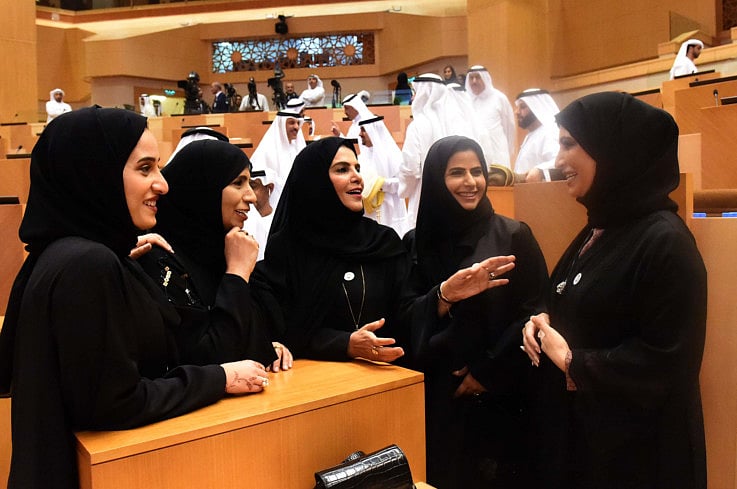Mohammad Bin Rashid opens new FNC session
Parliamentary process has received unlimited support from UAE leadership, Al Owais says

Abu Dhabi: His Highness Shaikh Mohammad Bin Rashid Al Maktoum, Vice-President and Prime Minister of the UAE and Ruler of Dubai, opened on Sunday the Federal National Council’s fourth and last regular session of the 16th legislative chapter, in the presence of Crown Princes and deputy rulers, ministers, diplomats, and senior civil and military officials.
President His Highness Shaikh Khalifa Bin Zayed Al Nahyan has issued a federal decree convening the 4rd regular session of 16th legislative chapter of the House.
Shortly before noon, Shaikh Mohammad arrived and was greeted by the guards of honour.
After recital from the Holy Quran, Shaikh Mohammad officially opened the council by seeking Allah’s blessings and praying to Him to aid in establishing what is in the good of the nation and the citizens.
Ten committees including the Future Committee, to help achieve the UAE Centennial goals to make the UAE the best country in the world by 2071, were elected.
Dr Amal Al Qubaisi, FNC Speaker, said during the last three sessions, the Federal National Council has made significant achievements in the legislative and regulatory spheres as well as in the field of parliamentary diplomacy.
“Our Council has taken a great step in reflecting the vision of the President His Highness Shaikh Khalifa Bin Zayed Al Nahyan, to make the House a supportive and control authority to further strengthen the government with its visions and innovative ideas,” Al Qubaisi said.
Abdul Rahman Al Owais, Minister of Health and Prevention, Minister of State for Federal National Council Affairs, said that the parliamentary process has received unlimited support from the UAE’s wise leadership, which, in turn, established the values of political participation and engagement.
“There have been a number of significant milestones that have also contributed to actively engaging citizens, most notable of which was the Political Empowerment Programme announced by His Highness Shaikh Khalifa Bin Zayed Al Nahyan, President of the UAE, in 2005, and on the occasion of the UAE’s 34th National Day,” Al Owais added.
He applauded the outstanding cooperation between the FNC, which discussed issues of concern for citizens, and the UAE Government, which addressed national matters with the utmost transparency, accuracy, and objectivity.
During this session, the House will review a number of draft laws including 2017 closing accounts, 2019 budget, railways and organisation of medical and pharmaceutical professions as well as effective use of communication and information technology by health care and public health professionals.
Since the beginning of this legislative chapter on November 18, 2015, the House has passed 45 draft laws spanning economic, social, health, security, cultural and sports areas. The council has also adopted 236 motions during the debate of 20 issues addressing social development, health, education, Emiratisation and services delivered to the public. The House has also put 152 questions to ministers concerning various sectors.
The FNC is one of the UAE’s five federal authorities, as established by the constitution. Its first session was opened on December 2, 1972. The FNC’s official mandate is to provide for public debate of legislation. The FNC discusses proposals and plans of various federal ministries, entities and public institutions.
There are 40 members of the FNC, apportioned among the UAE’s seven emirates, with eight seats each for Abu Dhabi and Dubai, six seats each for Sharjah and Ras Al Khaimah and four seats each for Ajman, Umm Al Quwain and Fujairah.
Since 2006, half of FNC members have been elected to serve four-year terms. The other half of the body comprises officials who have been appointed by the Ruler’s Court of the UAE’s seven emirates.
The FNC sessions, held in Abu Dhabi, are open to the public, except in exceptional closed sessions, which must be approved by a majority vote of the Council.
Next year, the UAE is set to hold parliamentary elections after the end of this legislative chapter by the end of June.
Sign up for the Daily Briefing
Get the latest news and updates straight to your inbox
Network Links
GN StoreDownload our app
© Al Nisr Publishing LLC 2026. All rights reserved.